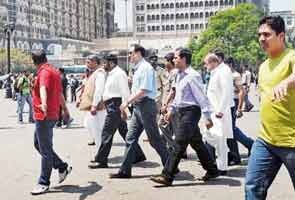
Mumbai:
The eight-member Judicial Commission from Pakistan, in Mumbai to record statements of four key witnesses in the 26/11 terror attacks case, raised questions yesterday when it expressly sought post-mortem information for 15 of the 166 victims who were killed in the November 2008 attacks.
The members of the Commission presented post-mortem files of 15 victims to the team of forensic doctors, asking them to explain the nature in which they had been killed. Of the 15 cases that were explained by the forensic doctors to the Commission, one was that of Amar Singh Solanki, captain of the vessel Kuber, which was hijacked by the terrorists to reach the shores of Mumbai. He was eventually beheaded.
Also on the list was the post-mortem report of Tukaram Omble, the assistant sub-inspector who captured Qasab, but was shot dead by him in the process. On Saturday afternoon, the Commission recorded the statements of two forensic experts -- Dr Ganesh Niturkar from JJ hospital, where a majority of autopsies for 26/11 victims were conducted, and Dr Shailesh Mohite, head of the Forensic department at Nair hospital. As most of 26/11 victims died after sustaining bullet injuries, doctors had recovered bullets from their corpses. The ballistic examination of each bullet will shed valuable light on the weapon it was fired from.
One of the possible rationales behind examining post-mortem reports could be the intention of determining the number of victims claimed by each of the terrorists, by taking into account the bullets fired from the weapons wielded by each member of the terror squad. However, officials dealing with the Commission appeared befuddled by the logic behind choosing only 15 reports, over the 151 others.
"There were over 166 deaths in the attack, and the fact that the Commission has handpicked 15 for explanation is strange. There was no clarity on why these particular cases were discussed," said a source.
The Commission is headed by Chaudhry Zulfiqar Ali and includes prosecutor Chaudhry Azhar, Deputy Director of Federal Investigation Agency Azad Khan, and defence lawyers Khwaja Haris, Riyaz Akram Choudhary, Fakhar Haayat, Raja Ehassan Ulhakhan and Isaam Bin Haris. While the Commission was denied permission to cross-examine the Indian witnesses, the team of forensic doctors was asked to give their opinions on 15 cases, each of which were presented by the Commission.
The Commission's POA in Mumbai
The Judicial Commission is in the city on behalf of the Pakistani anti-terror court, which is hearing the case against LeT commander Zaki-ur-Rehman Lakhvi and six others in connection with the 26/11 attacks.
The members of the Commission presented post-mortem files of 15 victims to the team of forensic doctors, asking them to explain the nature in which they had been killed. Of the 15 cases that were explained by the forensic doctors to the Commission, one was that of Amar Singh Solanki, captain of the vessel Kuber, which was hijacked by the terrorists to reach the shores of Mumbai. He was eventually beheaded.
Also on the list was the post-mortem report of Tukaram Omble, the assistant sub-inspector who captured Qasab, but was shot dead by him in the process. On Saturday afternoon, the Commission recorded the statements of two forensic experts -- Dr Ganesh Niturkar from JJ hospital, where a majority of autopsies for 26/11 victims were conducted, and Dr Shailesh Mohite, head of the Forensic department at Nair hospital. As most of 26/11 victims died after sustaining bullet injuries, doctors had recovered bullets from their corpses. The ballistic examination of each bullet will shed valuable light on the weapon it was fired from.
One of the possible rationales behind examining post-mortem reports could be the intention of determining the number of victims claimed by each of the terrorists, by taking into account the bullets fired from the weapons wielded by each member of the terror squad. However, officials dealing with the Commission appeared befuddled by the logic behind choosing only 15 reports, over the 151 others.
"There were over 166 deaths in the attack, and the fact that the Commission has handpicked 15 for explanation is strange. There was no clarity on why these particular cases were discussed," said a source.
The Commission is headed by Chaudhry Zulfiqar Ali and includes prosecutor Chaudhry Azhar, Deputy Director of Federal Investigation Agency Azad Khan, and defence lawyers Khwaja Haris, Riyaz Akram Choudhary, Fakhar Haayat, Raja Ehassan Ulhakhan and Isaam Bin Haris. While the Commission was denied permission to cross-examine the Indian witnesses, the team of forensic doctors was asked to give their opinions on 15 cases, each of which were presented by the Commission.
The Commission's POA in Mumbai
The Judicial Commission is in the city on behalf of the Pakistani anti-terror court, which is hearing the case against LeT commander Zaki-ur-Rehman Lakhvi and six others in connection with the 26/11 attacks.
Track Latest News Live on NDTV.com and get news updates from India and around the world

